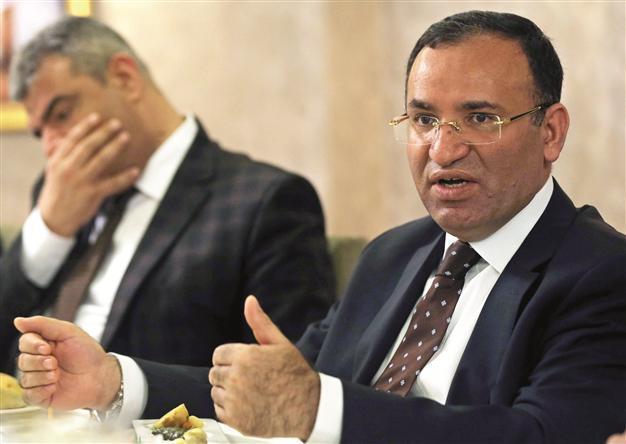No Red Notice by Interpol for Islamic scholar Gülen, justice minister says
ANKARA

Bozdağ described Gülen as a 'national asset' in the past. AFP photo
Justice Minister Bekir Bozdağ has stopped short of ruling out the possibility of filing a Red Notice by Interpol concerning the U.S.-based Islamic preacher Fethullah Gülen, but underlined that this would require an initiative by the judicial body rather than the executive.
Bozdağ said the Turkish government had not to his knowledge made any attempt for the extradition of Gülen, speaking during an interview on the Habertürk TV station on March 6.
When asked whether the Justice Ministry needed to take an initiative for Gülen’s return to Turkey, Bozdağ said there was “no obstacle” preventing Gülen, who has been in voluntary exile in the United States for over a decade, from returning to his country. He added that “various invitations” had been extended for his return.
“However, there are some assessments in favor of a search through a Red Notice because of illegalities, immoralities and some actions that are crimes in our law, which have all erupted within the framework of ongoing debates in Turkey. There is nothing we can do as the Justice Ministry within the framework of these assessments because the ministry has no such authority. This is entirely something which can happen within the content of an investigation,” he said.
Bozdağ reiterated that such an initiative for issuing a Red Notice by Interpol was dependent on a demand by judicial authorities and stressed that only after that stage would the executive authority convey this demand to relevant counterparts.
When asked whether Turkey had attempted to ask for the extradition of Gülen from the United States, he said “as far as I know, there is no such demand.”
Gülen is generally credited with having helped Prime Minister Erdoğan break the political power of a military that had for decades suppressed political Islam, but he had already become an estranged ally for Erdoğan even before the graft scandal erupted. The latter says the probes - which began with Dec. 17 raids that spread to sons of ministers and businesspersons close to Erdoğan - are concocted by followers of the movement, which is believed to have a strong influence in the police and judiciary. Gülen, however, strongly denies involvement in the scandal.
One of the invitations for Gülen’s return to which Bozdağ referred was personally extended by Erdoğan back in June 2012.
“We want this longing to end,” Erdoğan had told tens of thousands of spectators at Istanbul’s Türk Telekom Arena during the final event of the Turkish Olympiads, which brings together students from Gülen Movement schools all around the world.
At the time, Bozdağ was one of those who put his weight behind Erdoğan’s remarks.
Then-Deputy Prime Minister Bozdağ also described Gülen as a “national asset.”
“Turkey’s assets should be in Turkey. Our wish is for this longing to end,” he had said.
After the emergence of the far-reaching probe which he calls a “coup” attempt against his government, Erdoğan frequently alluded to the imminent possibility of launching a criminal investigation against “the parallel state” or “a state within the state,” which he says was built over years by Gülen and his followers.
